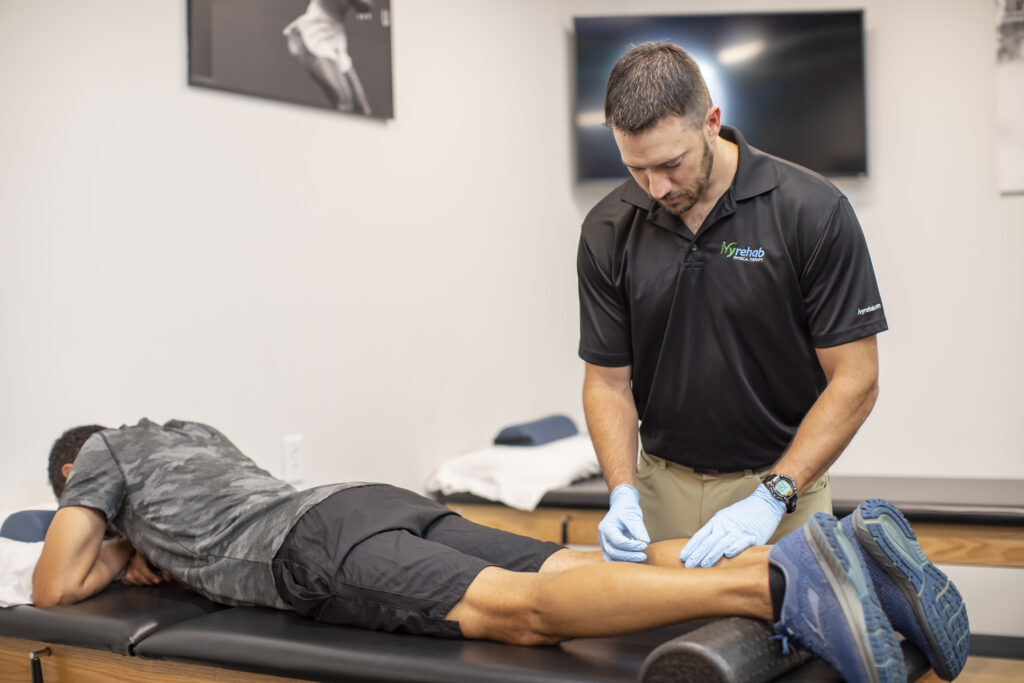
Dry Needling Therapy
At Ivy Rehab, we believe in personalized, evidence-based care to help you recover and thrive. Dry needling therapy is one of the many effective treatments we offer to reduce pain, release muscle tension, and promote healing, helping you get back to the activities you love.
What is dry needling?
Dry needling is often confused with acupuncture; however, they are very different needling techniques. A dry needling treatment focuses on reducing pain and accelerating healing through a deep understanding of the relationships between our bodies and our central nervous system. Specifically, dry needling is another form of soft tissue mobilization that can help reduce inflammation, decrease muscle tension, and ultimately relieve pain through trigger points.


What are the benefits of dry needling?
Licensed dry needling therapy provides a number of benefits, including:
- Pain relief
- Release or deactivate trigger points
- Improved range of motion
- Faster recovery time
- Reduced muscle tension
- Enhanced mobility and function
This technique helps break the cycle of chronic pain, making everyday activities easier and more comfortable.
How does dry needling work?
Dry needling targets trigger points—sensitive knots within muscles that can cause pain and limit mobility. Using a very thin filiform needle, our licensed physical therapists carefully insert the needle into the affected tissue to stimulate a healing response.
While dry needling is often compared to acupuncture, the two techniques are different. Dry needling is rooted in Western medicine principles and focuses specifically on treating muscle pain and dysfunction rather than balancing energy flow.

What is a Trigger Point?
A trigger point is a sensitive area of tense skeletal muscle. A trigger point can be tender to the touch and can cause other parts of the body to experience pain when touched.
What are the side effects of dry needling?
Dry needling is a safe and effective therapy when performed by trained professionals. Possible side effects include:
- Mild soreness at the needle site
- Minor bleeding or bruising
- Fatigue or lightheadedness
Your provider will discuss what to expect and how to optimize your recovery after your session.
What Kind of Needles Are Used?
Dry needling therapy uses a very thin filiform needle (which is different from an acupuncture needle) to stimulate trigger points in connective tissue so a licensed physical therapist can target tissues that are not manually palpable. The goal of dry needling is to release tension on tight muscle bands associated with trigger points that are causing pain. Trigger points can make it painful to perform everyday activities and often radiate pain to other areas of the body. Dry needling physical therapy treatment focuses on stimulating those trigger points, which has been shown to reduce pain and speed up the patient recovery process.
Dry needle therapy has been used to successfully treat:
Why choose Ivy Rehab for dry needling?
When you choose Ivy Rehab, you can expect:
- Personalized, goal-driven treatment plans
- Highly trained and certified physical therapists
- A caring team focused on your full recovery
- Integrated therapies for comprehensive healing
Whether you’re seeking relief from muscle tightness, sports injuries, or chronic pain, Ivy Rehab’s dry needling services can help you move better and feel better.
FAQs
Can dry needling be combined with other treatments?
Absolutely. Dry needling is often most effective when used alongside other physical therapy techniques, such as manual therapy, targeted stretching, strengthening exercises, and mobility work. Combining treatments allows your therapist to take a well-rounded, holistic approach to reducing pain, restoring function, and supporting long-term healing.
How many dry needling sessions will I need?
The number of sessions depends on your specific condition, how long you’ve been experiencing symptoms, and how your body responds to the treatment. Some people notice relief after just one or two sessions, while others may benefit from a series of appointments. Your Ivy Rehab physical therapist will work with you to develop a personalized treatment plan based on your unique needs and recovery goals.
Is dry needling painful?
Most patients experience only a brief twitch, ache, or cramping sensation when the needle activates a trigger point. While it may feel slightly uncomfortable in the moment, any soreness typically subsides within a day or two. Many people find that short-term discomfort is worth long-term pain relief and improved mobility.
Ready to find relief?
Request your dry needling session today at an Ivy Rehab Network location near you to learn more about chronic pain relief.

